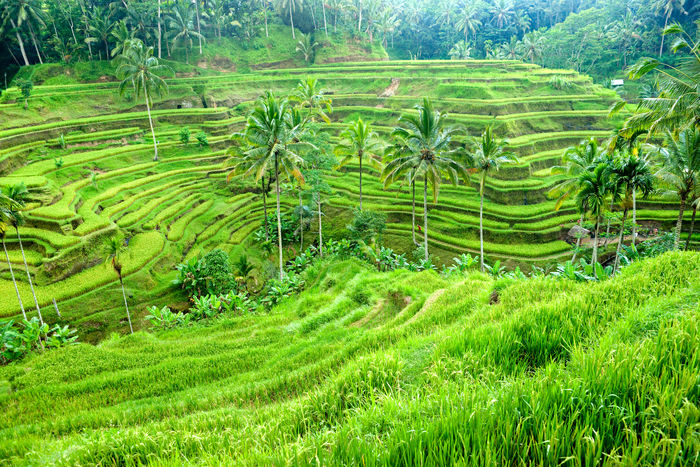Indonesia, a sprawling archipelago of more than 13,000 islands, is one of south east Asia's most diverse treasures. It's remarkable and varied landscape contains innumerable contrasts; from idyllic white sand beaches to fiery volcanoes, and from rugged barren landscapes to dense jungle inhabited by exotic animals.
The Indonesian people themselves are as varied as the landscapes they inhabit. Indonesia is the world's largest Islamic country with 90% of the country's 235m population practicing Muslims, but there are also many other religious influences present in the country including Hinduism, Buddhism and Christianity. Culture is correspondingly varied and over 350 languages are spoken throughout the archipelago. While in Jakarta businessmen may be haggling over deals, the Baliem tribe in Papua will be decorating their hair with cassowary feathers and coating themselves in pig fat to keep warm. With a culture and people so rich and diverse, Indonesia is one of south east Asia's most attractive destinations.
Despite the varied culture, the one thing the people do have in common is their friendliness. Indonesians are amongst the friendliest in south east Asia, which is in itself one of the most sociable areas in the world. Wherever you travel in the country you will more than likely be greeted by a chorus of 'Hello Mister's from the local population. Indonesians have no inhibitions when it comes to starting conversations with strangers and you will frequently find yourself in passing conversations with numerous locals. The people are so sociable that it may take some getting used to.
These aspects of Indonesian life may seem a little hard to believe on first arrival into the country. The two main international airport cities of Jakarta in Java and Kuta in Bali, are far removed from the highlights of the country. Jakarta is a huge, rather unpleasant city with traffic jams, shopping malls and skyscrapers; Kuta is a hedonistic beach resort with high rise luxury hotels and thousands of tourists. Unfortunately these areas may serve as a rather negative introduction to the archipelago which is wholly unrepresentative of the country. Once out of these areas, visitors will discover the cultural and scenic beauty of the country.
With the richness of landscape and culture that Indonesia possesses, it is somewhat surprising that it is not a more popular tourist destination. There is potential for activities that cater to every conceivable taste. In Java alone, you can climb the numerous volcanoes (active and dormant) that span the island, spend some time admiring the impressive flora and faunae in the islands remote national parks, see the sunrise over Borobodur, the world's largest and most impressive Buddhist temple, or find your own deserted island paradise in the Karimunjawa national park. Bali and Lombok have numerous excellent surf sights, spectacular rice paddy landscapes, large beaches, idyllic islands and the ability to indulge in the richness of the country's food and culture. The warm and wet equatorial climate enhances the natural attractions of the country. Tropical rain keeps the country looking fertile and lush while the temperature of around 28?C/82?F makes the country pleasantly warm to travel around in or to laze on the beach in. Despite this, tourism in much of Indonesia is extremely limited and it is very possible to go for days without seeing another western face.
Perhaps the reason for the relatively low visitors is because of the recent problems in Bali. The Bali bombings of October 2002 has given Indonesia a fairly negative world wide impression of the safety of the country. The recent blanket warnings against travel to the archipelago by the foreign offices of the US, the UK and Australia have reinforced this perspective and severely hit the tourist industry.
It cannot be denied that Indonesia has had a troubled past, but fortunately it seems to have emerged from these times and moved on to a happier future. Travel round the country is safe and easy in the main tourist areas of Java, Bali and Lombok. Further afield than these areas, travel can be more infrequent and slower but is still by no means dangerous. Violent crime is a rarity although (as with anywhere) obviously not unheard of. Crime that you do need to be aware of as a tourist will take the form of con tricks. There are a few well known tricks, most notably the batik scams in Yogyakarta, but if you use your common sense when conducting transactions then you should avoid trouble. Political troubles in the archipelago are not unknown, so its best to keep up to date with travel warnings and ask around locally before you travel to areas you suspect may be volatile. If you stick on the main route of Java-Bali-Lombok however, you should not encounter any problems.
Travel round the country can be a little trying at times. Despite the abundance of methods to get around the country, travel often requires a certain amount of patience. The relaxed pace of life is reflected in the transport systems, with the local transport often waiting until full before departing and crippling traffic jams in cities producing further delays. Consequently you should allow more time for travel than initially expected. It is very rare for transport to actually arrive at your destination at the time you are told, and this can mean that you may need to spend nights in commuter towns you were not expecting to. Trains prove to be more reliable than transport by road although they have limited scope for travel as lines only run through the north and south of Java. Boats are often quite efficient although these are still affected by weather conditions so are still slightly unreliable.
However there are two advantages to travel in Indonesia. Firstly is it is very cheap. On local buses, an hour long journey will cost around 7,000 Rupiah, and bemo's and colts can be cheaper still. Long distance overnight buses cost significantly more (aprox. 100,000 Rp for a 12 hour journey), but these tend to be pretty luxurious. The other main advantage of travel is the scenery. Once you are out of the cities, the scenery on journeys is often incredible. It is incredibly easy to wile away the hours on long journeys by gazing out at the fertile volcanic landscape passing by you.
There are ample opportunities to shop in Indonesia. Bali is the best place to shop in the archipelago, with every conceivable item readily available. This is an excellent place to buy an incredible variety of souvenirs, arts and crafts, clothes, batik, and wood carvings. Street vendors line kilometers worth of roads, but if you still want more there are plenty of markets held regularly on the Island and hawkers who you will find just about everywhere. Although the availability and range of goods here is excellent, this may not be the cheapest place to buy items. Prices are often ridiculously high (but can be bargained down quickly), and quality is not always the highest. Make sure to operate on a buyer beware policy; check goods thoroughly before you buy them – chances of a refund are very slim. Yogyakarta is the best place for shopping in Java, but exercise the same caution as you would in Bali.
To buy these traditional arts and crafts at much cheaper prices it is best to head out to the smaller, more remote towns in the archipelago. Markets and vendors in these areas will only sell arts and crafts made locally. This means that the selection is smaller, but prices can be many times cheaper than in the very touristy areas. Along with these more traditional street stalls, there are large western style malls in some of the bigger cities. These house more upmarket clothes shops, alongside Indonesian department stores and western fast food restaurants. Jakarta has the largest array of these malls, but most big towns/cities will have at least one. Prices here will be fixed, so you will need to practice your bargaining skills elsewhere.









Comments